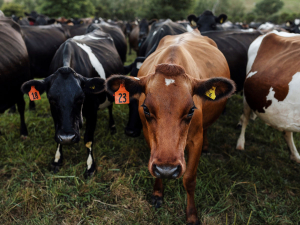We must keep our foot on the pedal
OPINION: Last week marked a major step forward in our work to eradicate Mycoplasma bovis.
 OSPRI has taken over the day-to-day control of the Mycoplasma bovis (M. bovis) eradication programme.
OSPRI has taken over the day-to-day control of the Mycoplasma bovis (M. bovis) eradication programme.
OSPRI – the government agency that manages animal disease and pest control in the farming industry – has taken over the day-to-day control of the Mycoplasma bovis (M. bovis) eradication programme.
M. bovis governance group independent chair Kelvan Smith says OSPRI will oversee operational and disease control functions under a contract for service.
“OSPRI’s role will include the testing of farms, managing the current active confirmed property, any newly detected farms, cleaning and disinfection, and farmer support.”
Smith adds that the programme partners – MPI, Beef + Lamb New Zealand and DairyNZ – will continue to provide governance and monitor progress.
“MPI will retain nonoperational aspects of the programme, including compensation and any necessary compliance action,” he explains. “We expect farmers to notice very little difference from current operations and the existing Government Industry Agreement between MPI, DairyNZ and Beef + Lamb New Zealand remains in place until a National Pest Management Plan (NPMP) is approved and established.”
Smith says the consultation on an NPMP recently closed with some good submissions from farmers.
“We have received submissions that are largely supportive of the proposal and the next step is to analyse and consider the feedback and update the draft proposal as appropriate.”
It is expected the final proposal will be submitted to the Government in early 2024. “We are planning for the NPMP to be in place by mid next year, subject to approval.”
Smith says the M. bovis eradication programme continues to perform well.
“The number of infected properties has fallen to very low levels and the major activity of the programme will be national surveillance of New Zealand’s cattle herd.”
He adds that the timing is now right to look at capitalising on the identified efficiencies to ensure all the partners – DairyNZ, Beef + Lamb New Zealand and the Government – are receiving value for their investment.
Smith believes that farmers should not be affected by the move and the M. bovis levies will not increase.
“OSPRI will provide extensive experience in disease management and surveillance, with an established regional management model for disease management,” he says.
“There will be streamlined engagement and operational efficiencies with existing OSPRI programmes, NAIT and TBfree.”
Agrisea NZ has appointed Craig Hudson as it's new chief growth officer.
State farmer Landcorp, trading as Pamu, is a forecasting a full-year net profit of around $100 million.
Tony Aitken, chief executive of Ruralco, has been awarded the Excellence in Business Leadership Award at the ANZ Business of the Year Awards.
Global trade has been thrown into another bout of uncertainty following the overnight ruling by US Supreme Court, striking down President Donald Trump's decision to impose additional tariffs on trading partners.
Controls on the movement of fruit and vegetables in the Auckland suburb of Mt Roskill have been lifted.
Fonterra farmer shareholders and unit holders are in line for another payment in April.

OPINION: Here w go: the election date is set for November 7 and the politicians are out of the gate…
OPINION: ECan data was released a few days ago showing Canterbury farmers have made “giant strides on environmental performance”.